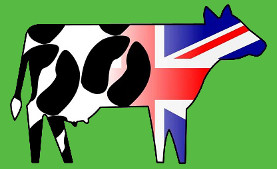By Hendry, K. A. K. and Knight, C. H. and MacCallum, A. J. and Wilde, C. J., Journal of Dairy Research, 1999
Description
The hormonal regulation of keratin synthesis and cell proliferation in the bovine hoof was studied using tissue explants in organ culture. As the highest incidence of laminitis occurs during early lactation, the study focused on insulin, cortisol and prolactin, 3 hormones implicated in lactogenesis and galactopoiesis. Incubation of tissue explants for 24 h in medium containing insulin (10-5000 ng/ml) stimulated protein synthesis measured by incorporation of 35S-labelled amino acids. Histochemical examination showed that insulin binding co-localized with the site of protein synthesis. Insulin also stimulated DNA synthesis, an index of cell proliferation, which was measured by incorporation of [3H]methyl thymidine. Cortisol (10-5000 ng/ml) decreased protein synthesis, whereas prolactin (10-5000 ng/ml) had no significant effect on protein or DNA synthesis. Epidermal growth factor (10-200 ng/ml), a potent inhibitor of keratinization in other tissues, stimulated protein synthesis compared with untreated controls. Epidermal growth factor binding was located microscopically to the germinal and differentiating epidermal layers. SDS-PAGE and fluorography showed that the population of proteins synthesized in the presence of any hormone or growth factor combination did not differ from that in untreated controls and included the keratins involved in horn deposition. It is concluded that bovine hoof keratinization is under endocrine and growth factor control, and that systemic changes in lactogenic hormones inhibit keratin deposition
The hormonal regulation of keratin synthesis and cell proliferation in the bovine hoof was studied using tissue explants in organ culture. As the highest incidence of laminitis occurs during early lactation, the study focused on insulin, cortisol and prolactin, 3 hormones implicated in lactogenesis and galactopoiesis. Incubation of tissue explants for 24 h in medium containing insulin (10-5000 ng/ml) stimulated protein synthesis measured by incorporation of 35S-labelled amino acids. Histochemical examination showed that insulin binding co-localized with the site of protein synthesis. Insulin also stimulated DNA synthesis, an index of cell proliferation, which was measured by incorporation of [3H]methyl thymidine. Cortisol (10-5000 ng/ml) decreased protein synthesis, whereas prolactin (10-5000 ng/ml) had no significant effect on protein or DNA synthesis. Epidermal growth factor (10-200 ng/ml), a potent inhibitor of keratinization in other tissues, stimulated protein synthesis compared with untreated controls. Epidermal growth factor binding was located microscopically to the germinal and differentiating epidermal layers. SDS-PAGE and fluorography showed that the population of proteins synthesized in the presence of any hormone or growth factor combination did not differ from that in untreated controls and included the keratins involved in horn deposition. It is concluded that bovine hoof keratinization is under endocrine and growth factor control, and that systemic changes in lactogenic hormones inhibit keratin deposition
We welcome and encourage discussion of our linked research papers. Registered users can post their comments here. New users' comments are moderated, so please allow a while for them to be published.
